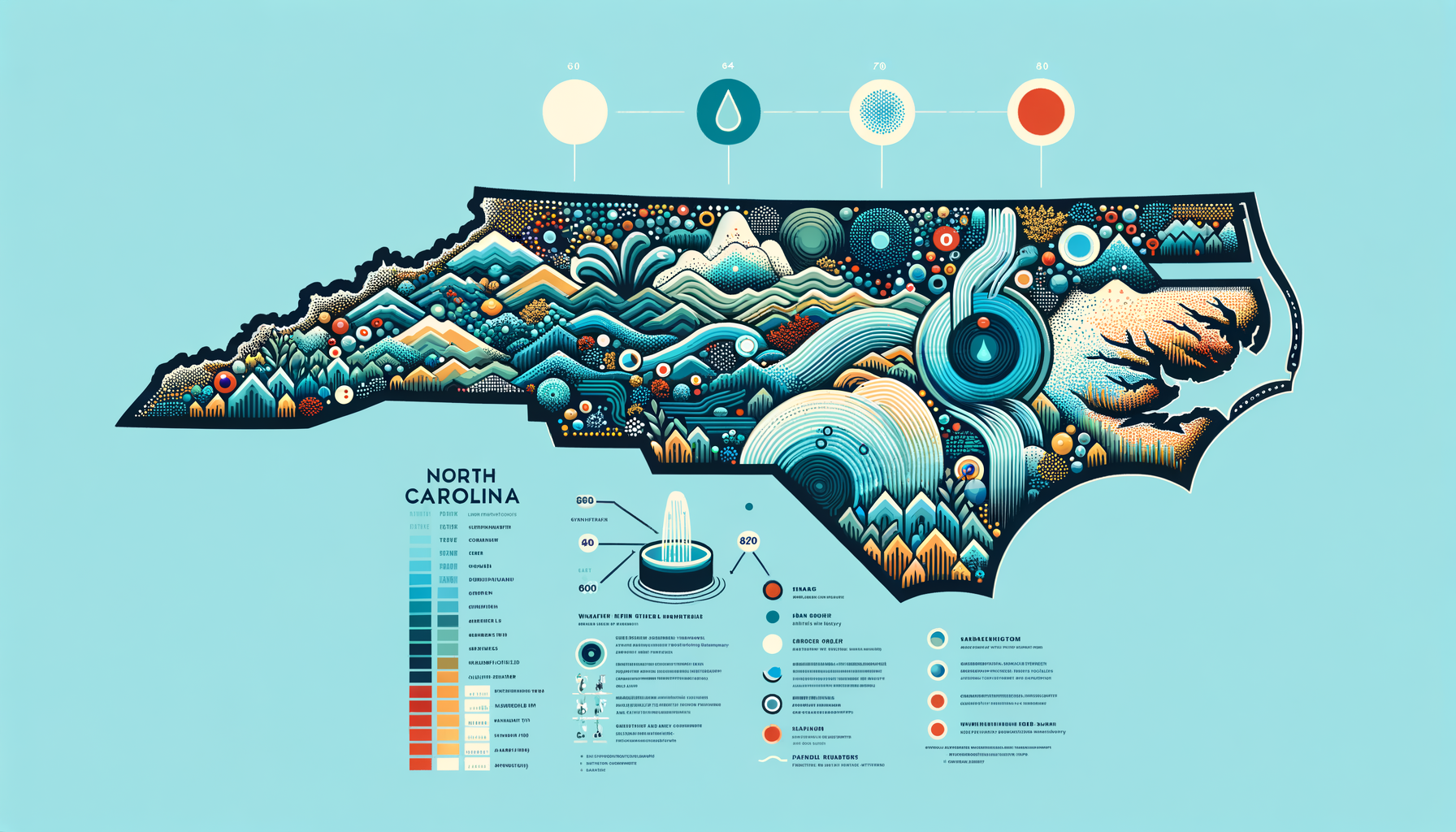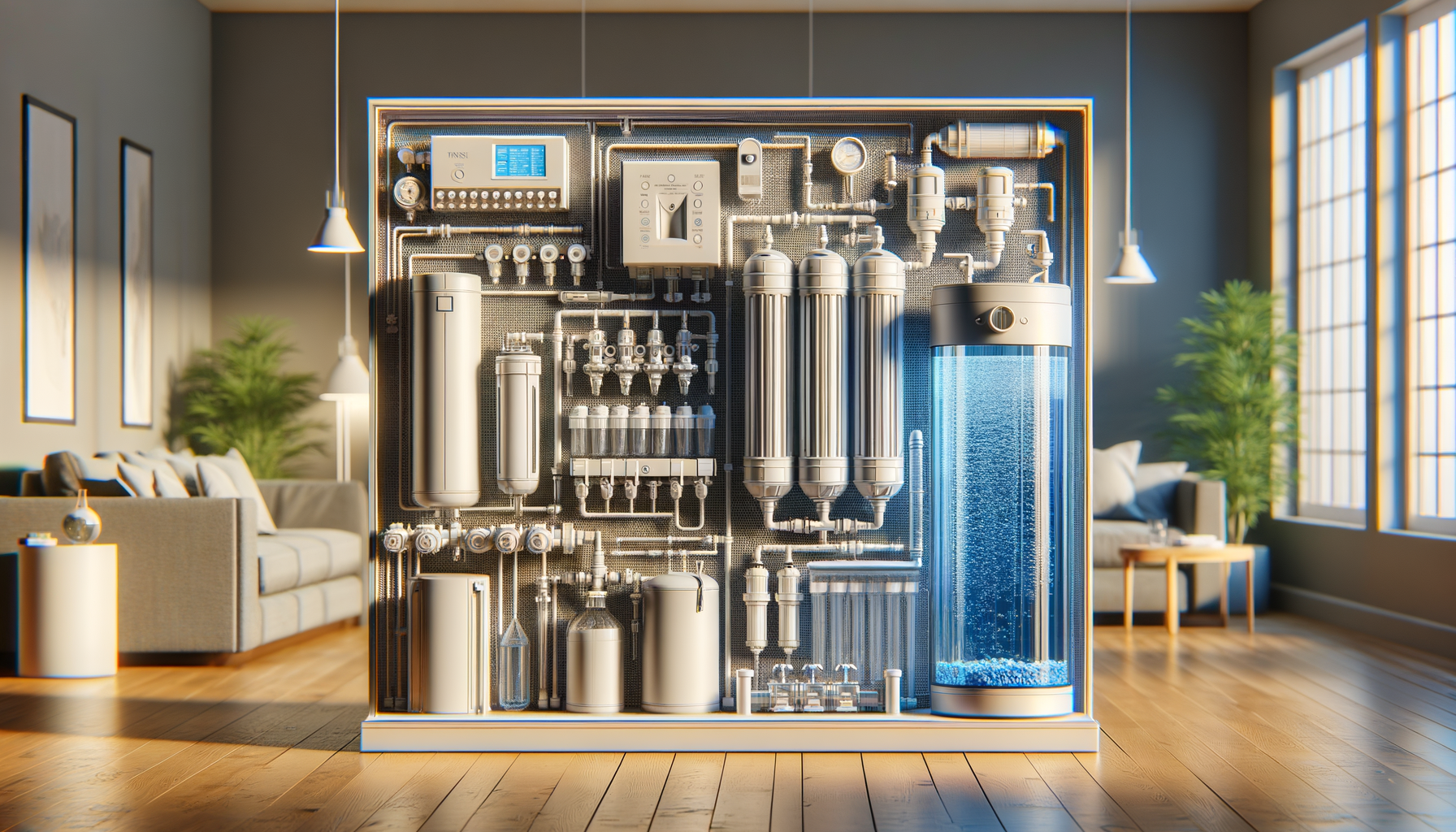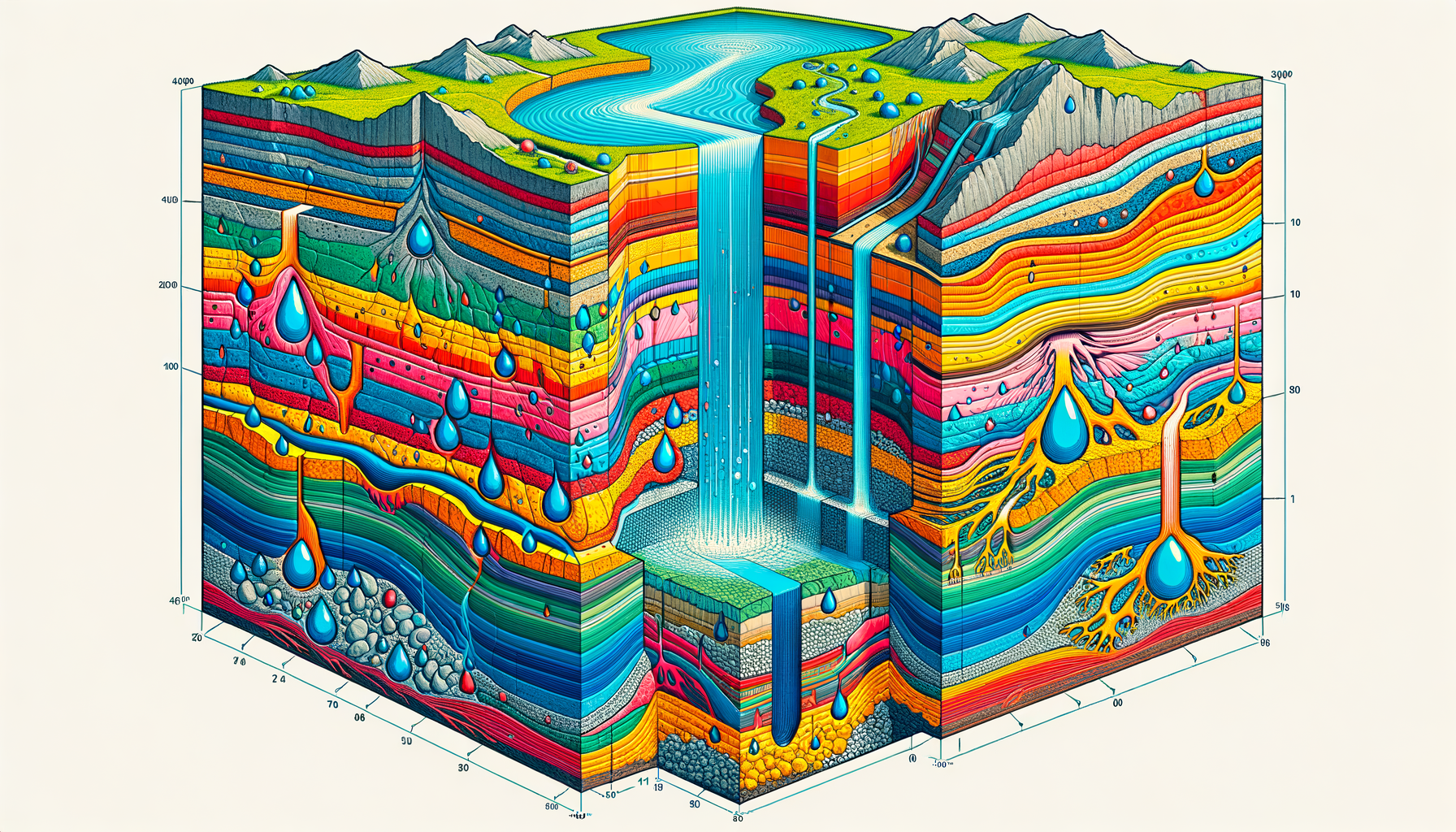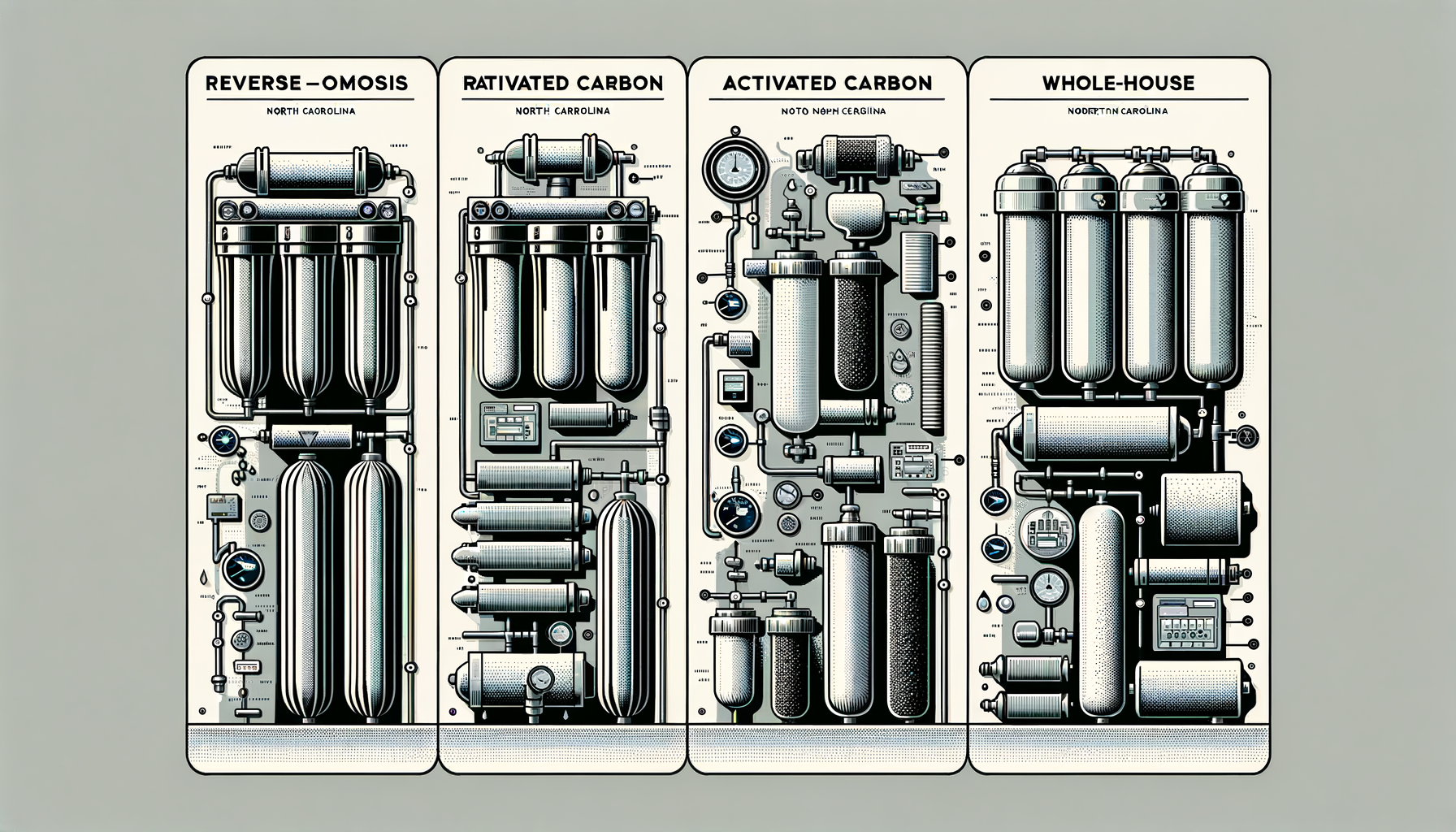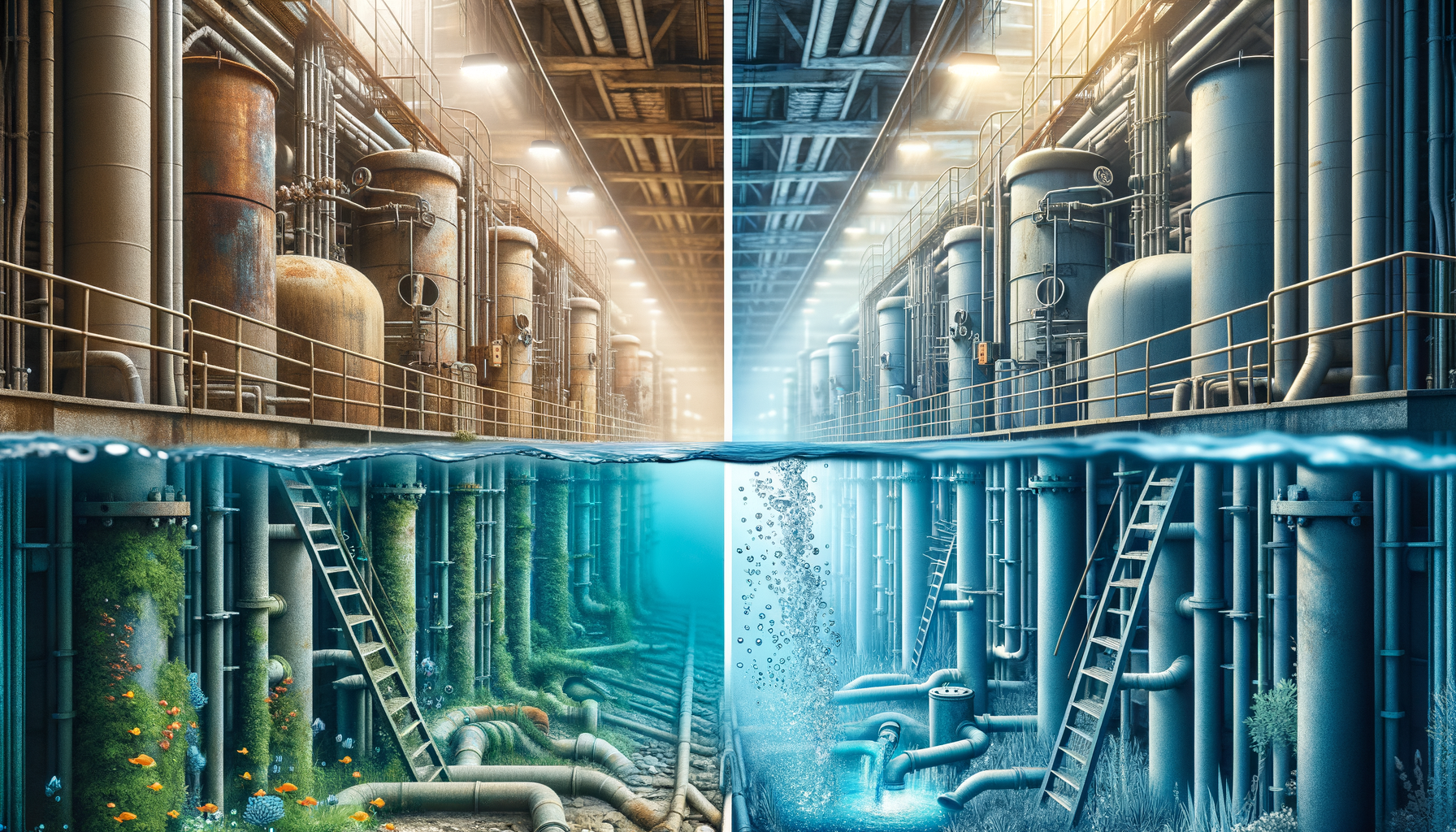Comprehensive Guide to Water Quality in North Carolina: Contaminants, Issues, and Water Filtration Solutions
by Ryan Moreau / updated February 10th, 2025
North Carolina is a state with diverse water resources, from the coastal plains and barrier islands to the Appalachian Mountains in the west. The state’s water systems include major rivers like the Cape Fear, Neuse, and Catawba, as well as numerous lakes and aquifers that provide vital drinking water to its residents. However, North Carolina faces significant water quality challenges due to industrial activities, agricultural runoff, and growing urbanization. In this comprehensive guide, we explore the common contaminants in North Carolina’s water, regional water quality challenges, and effective filtration solutions. Start by using our Water Quality Tool to get a customized analysis of your local water conditions.

Overview of North Carolina’s Water Sources
North Carolina’s water supply reflects the state’s varied geography, encompassing coastal plains, rolling piedmont, and mountainous regions. Key sources include:
- Major River Basins: Rivers such as the Cape Fear, Neuse, and Catawba are essential for drinking water, industry, agriculture, and recreation.
- Reservoirs and Lakes: Bodies of water like Lake Norman, Jordan Lake, and Falls Lake provide municipal water supplies and recreational opportunities.
- Groundwater Aquifers: Many communities, especially in rural areas, rely on groundwater from aquifers like the Castle Hayne and Cretaceous aquifers.
- Coastal Watersheds: The coastal plain region utilizes surface water and shallow wells but is vulnerable to saltwater intrusion and contamination.
Ensuring the quality of these water sources is critical, requiring continuous monitoring and advanced treatment processes to meet the needs of North Carolina’s growing population.
Common Water Quality Contaminants in North Carolina
North Carolina’s water sources face various contaminants due to industrial processes, agricultural activities, and natural geological formations. To better understand what might affect your area, start with our Water Quality Tool and then review these common issues:
1. Per- and Polyfluoroalkyl Substances (PFAS)
PFAS contamination is a significant concern in North Carolina, notably in the Cape Fear River Basin, due to industrial discharges from chemical manufacturing plants. Chronic exposure can lead to adverse health effects, including hormonal disruptions and increased risk of cancer. For more detailed information, visit the EPA PFAS Tools and our PFAS Contamination Guide.
Water Filtration Options for PFAS: Reverse Osmosis Water Filters, Activated Carbon Water Filters
2. Nitrates
Agricultural runoff and concentrated animal feeding operations (CAFOs) in North Carolina contribute to elevated nitrate levels in surface water and groundwater. Excess nitrates pose health risks, particularly to infants, leading to conditions like methemoglobinemia or “blue baby syndrome.”
Water Filtration Options for Nitrates: Reverse Osmosis Water Filters
3. Hexavalent Chromium
Hexavalent chromium, a toxic heavy metal, has been detected in some North Carolina wells, often associated with coal ash ponds and natural geological deposits. Long-term exposure can increase the risk of cancer and other serious health problems.
Water Filtration Options for Hexavalent Chromium: Reverse Osmosis Water Filters, specialized filters targeting heavy metals.
4. Arsenic
Natural deposits and industrial activities can lead to arsenic contamination in North Carolina’s groundwater. Prolonged exposure to arsenic is linked to various health issues, including skin lesions, cardiovascular diseases, and increased cancer risk.
Water Filtration Options for Arsenic: Reverse Osmosis Water Filters, ion exchange systems.
5. Disinfection Byproducts
Municipal water systems often use chlorine to disinfect water, which can react with natural organic matter, forming disinfection byproducts like trihalomethanes (THMs) and haloacetic acids (HAAs). These compounds are associated with long-term health risks.
Water Filtration Options for Disinfection Byproducts: Activated Carbon Water Filters
6. Bacterial Contamination
Flooding from hurricanes and storms can introduce microbial contaminants into private wells and municipal systems. Bacteria such as E. coli and coliforms pose immediate health risks.
Water Filtration Options for Bacterial Contamination: Reverse Osmosis Water Filters with UV purification systems.
7. Pesticides and Herbicides
Intensive agricultural activities can lead to pesticide and herbicide runoff entering water supplies, especially in rural areas. Exposure to these chemicals can have various health impacts, including neurological and reproductive effects.
Water Filtration Options for Pesticides and Herbicides: Activated Carbon Water Filters, Reverse Osmosis Water Filters
8. Iron and Manganese
High levels of iron and manganese are common in North Carolina’s well water. While not typically harmful to health, they can affect the taste, color, and staining of water, as well as clog pipes and appliances.
Water Filtration Options for Iron and Manganese: Specialized iron filters, oxidizing filters, and water softeners.
9. Lead
Aging infrastructure and lead service lines in older communities can result in lead leaching into the drinking water. Lead exposure is particularly harmful to children, affecting development and causing neurological issues.
Water Filtration Options for Lead: Reverse Osmosis Water Filters, certified filters specifically designed to remove lead.
Regional Water Quality Challenges in North Carolina
North Carolina’s diverse regions—coastal plains, piedmont, and mountains—each face unique water quality challenges. According to the EPA and the North Carolina Department of Environmental Quality (NCDEQ), significant challenges include:
1. Coastal Areas: Saltwater Intrusion and Sea Level Rise
Coastal communities in North Carolina are increasingly affected by saltwater intrusion due to over-pumping of groundwater and rising sea levels. This issue contaminates freshwater aquifers with saline water, making it unsuitable for drinking and agriculture.
2. Piedmont Region: Industrial Contamination
The Piedmont area, home to numerous industries, faces challenges from industrial pollutants, including PFAS, heavy metals, and solvents. Facilities like chemical plants and manufacturing sites have contributed to groundwater and surface water contamination (EPA – Industrial Wastewater Management).
3. Agricultural Runoff in Eastern North Carolina
Eastern North Carolina has extensive agricultural activities, including hog farming and crop production. Runoff from these operations introduces nutrients (like nitrates) and pathogens into waterways, leading to algal blooms and ecosystem disruption (EPA – Nutrient Pollution).
General Water Characteristics in North Carolina
Beyond specific contaminants, North Carolina’s varied geology and climate contribute to the state’s unique water characteristics. Understanding these properties assists in selecting appropriate treatment solutions:
1. Water Hardness
Water hardness in North Carolina varies widely. In areas where water is sourced from groundwater wells, especially in the piedmont and mountain regions, higher levels of calcium and magnesium contribute to hard water. Hard water can cause scale buildup in plumbing and reduce the efficiency of water heaters and appliances.
For households dealing with hard water, water softeners are recommended. If you’re unsure whether you need a water softener or which type suits your family’s needs, try our Water Softener Calculator for personalized guidance.
2. Acidic Water Conditions
In certain parts of North Carolina, especially in the coastal plain, groundwater can be naturally acidic due to the presence of humic acids from decaying organic matter. Acidic water can be corrosive, potentially leaching metals like copper and lead from plumbing systems.
- Low pH Levels: Acidic water with pH below 7 can corrode metal pipes and fixtures.
- Impact on Infrastructure: Homes with older plumbing are particularly susceptible to issues caused by acidic water.
To neutralize acidic water, installing an acid neutralizer can help balance the pH and protect your plumbing.
3. Sediment and Turbidity
Heavy rainfall and storm events can increase sediment and turbidity in North Carolina’s surface water sources. This is especially true in areas prone to erosion or where agricultural practices disturb the soil. High sediment levels can impact water treatment processes and reduce the effectiveness of disinfection.
- Erosion from Storms: Hurricanes and tropical storms contribute to increased sediment in water sources.
- Agricultural Practices: Soil disturbance from farming can lead to runoff carrying sediment into waterways.
Installing sediment filters as part of a whole house water filtration system can help address turbidity issues, enhancing overall water quality.
Utilizing the Water Quality Tool for North Carolina Residents
Understanding your local water quality is essential for ensuring safe drinking water. Our Water Quality Tool enables North Carolina residents to:
- Enter their zip code for a detailed analysis of local water sources
- View data on common contaminants in public and private water supplies
- Receive personalized recommendations for filtration systems based on your water quality challenges
Recommended Filtration Solutions for Common North Carolina Contaminants
Based on the prevalent contaminants identified in North Carolina’s water sources, the following filtration systems are highly recommended:
1. Reverse Osmosis Systems
Reverse Osmosis Systems offer comprehensive removal of a wide range of contaminants, including PFAS, nitrates, arsenic, hexavalent chromium, and lead. These systems are ideal for addressing the complex water quality issues found in North Carolina.
2. Activated Carbon Filters
Activated Carbon Filters are effective at removing chlorine, disinfection byproducts, pesticides, herbicides, and improving taste and odor. They are a good option for municipal water supplies that undergo chlorination.
3. Whole House Water Filtration Systems
Whole House Water Filtration Systems provide a comprehensive solution for issues like sediment, iron, manganese, acidity, and hardness. These systems ensure all the water entering your home is treated, protecting your plumbing and appliances.
Local Water Testing Services in North Carolina
Accurate water testing is essential to identify the specific contaminants in your water supply. We recommend using SimpleLab for comprehensive water quality analysis. Their user-friendly kits and detailed lab reports empower you to make informed decisions about your water filtration system.
Case Studies: Addressing Water Quality Issues in North Carolina
Real-world examples provide valuable insights into how various water quality challenges in North Carolina are being addressed:
1. Wilmington: Combating PFAS Contamination
In Wilmington, residents discovered significant levels of PFAS in their drinking water, primarily originating from industrial discharges into the Cape Fear River. In response, local utilities implemented advanced filtration processes, including granular activated carbon and ion exchange systems, to reduce PFAS levels. Homeowners have also adopted reverse osmosis systems for additional protection.
2. Rural Communities: Addressing Nitrate Pollution
Rural areas in eastern North Carolina, heavily influenced by agriculture, have faced high nitrate levels in groundwater. Initiatives focusing on better agricultural practices, improved waste management in livestock farms, and providing access to reverse osmosis filters for private wells have helped mitigate nitrate contamination.
3. Mountaineers: Dealing with Acidic Water
In the mountain regions, residents with private wells often encounter acidic water causing corrosion in plumbing systems. By installing acid neutralizer systems and conducting regular water testing, these communities have successfully protected their plumbing infrastructure and improved water quality.
Call to Action
North Carolina’s diverse water sources—from the coastal plains to the Appalachian Mountains—demand proactive water quality management. Understanding your local water challenges and implementing effective filtration solutions is essential for safeguarding your household’s health.
Start by entering your zip code into our Water Quality Tool for a detailed analysis of your water supply. Then, explore our filter review articles to find the most effective system for your needs. Finally, confirm your water’s safety with comprehensive water testing services to ensure you have the clean, safe water your home deserves.

